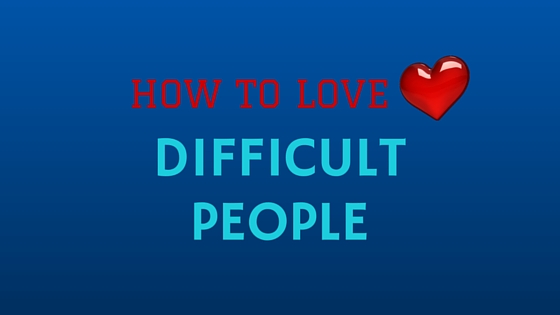We all know difficult people. That person might be someone we also love, or want to love more – a wild child, a stubborn spouse or partner, a critical parent, a jealous friend, relatives who’d love us more if we’d just be their version of ourselves. Or perhaps the difficult person is an antagonistic co-worker, a bully, a curmudgeon, a temperamental boss, an unfriendly neighbor, or a vindictive enemy.
Difficult people in our lives can trigger our anxieties, self-doubt, fears, loneliness, and relational conflicts. We often get depressed, sometimes for years, dealing with a difficult people within our own families.
I’ve had many difficult people in my life, including family members. Years of prayer, God’s grace, and forgiveness has set me free. But, I found difficult people don’t go away, they pop up in our lives like Jack-in-the-Boxes. Recently, I came across one in a work situation. I had hired a woman on my last documentary project to help interview a few experts on the east coast. When it came time to add credits to the end titles, she wanted co-producer credit for doing 1/16th of what such a job entailed. When I confronted her on her actual responsibilities, offering a more appropriate title, she spewed venomous insults, writing long emails threatening to sue me.
Difficult people can ignite our fears and can fuel our anger, which only causes more conflict. I’ve learned, it’s best if we put down our swords.
But how specifically do we deal with such troublesome co-workers, controlling family members, neighbors who snarl when take out the garbage at the same time?
Scripture offers wisdom:
Jesus says, “To one who strikes you on the cheek, offer the other also, and from one who takes away your cloak do not withhold your tunic either. Give to everyone who begs from you, and from one who takes away your goods do not demand them back.”
After much reflection, with Jesus’ words in mind, I let go of my initial anger toward my co-worker, giving her the co-producer credit that seemed to her – well – dire. I surely didn’t want to be in small claims court for weeks at a time. But that wasn’t why I gave her what she wanted. It was something more. It was the right thing to do, to turn the other cheek.
Author Donald Miller outlines the benefits of turning the other cheek, “I see no benefit to seeking vengeance. It doesn’t right a wrong, it doesn’t make things better, and it doesn’t create sustained peace.”
I felt at peace with the decision with my co-worker.
Fighting back only causes pain. It’s the peaceful marches –like those led by Martin Luther King that make lasting change, that move in the direction of creating beloved communities, like the early followers of Jesus that carved pathways of love through the mountains of hate and oppression through centuries.
Later on my co-worker apologized for her insults.
Life on earth, especially in relationship with human beings is complicated. Behind the airbrushed photos of our lives are stories, human beings with complex personalities, emotional and psychological complexities and needs, and dysfunctional family histories.
It’s likely many difficult people will be born from the mix of humanity, like runts born in a litter of puppies.
We can learn from the kind of people who would chose the runt out of the doggie litter. They love and care for the runt. We can learn to love difficult people just like they love the runt.
When we imagine the difficult person before us as a little child, we might glimpse a scar from their past, their need for love, and even the need to love, but they don’t know how. We can step back and wonder about just what made this person difficult? What need lies behind their difficult traits? Fear? Their own childhood hurts?
St. Francis says it well, “Seek to understand and not be understood”. It’s one way toward a more peaceful world.
We can also pray for these difficult people, perhaps your abusive mother or father still nags, criticizes and controls you. The curmudgeon refuses your kindness. Instead of allowing these ‘hard to love ones’ fuel resentments, irritation, or steal our peace, we can pray that person will chill out, for their hearts to soften, for the healing of their difficult qualities. Or we can choose to be loving but firm with them.
We heed Jesus’ words, “pray for those who abuse you”.
Or as scripture says, “If it be possible, as much as you can, live peaceably with all.. Let your speech be always with grace, seasoned with salt.”
Sometimes, yes, it’s ourselves who need the prayers, for patience, strength, and compassion, so we can meet that person with love. Or perhaps we need prayers for healthy boundaries so we don’t become the movie screens for their projections–for their unresolved dramas, pains, fears and hurts.
Pray without ceasing.
Sometimes it’s necessary to protect ourselves from such difficult people. If a person is antagonistic, perhaps we need powerful prayers for protection.
Sometimes we even need to leave the difficult person. I think of King David, before he was king, running and hiding from the wrath of a jealous, King Saul intent on killing him. David ran far and wide to hide while King Saul pursued him with vengeance.
His response to King Saul: “May the Lord avenge the wrongs you have done to me, but my hand will not touch you. As the old saying goes, ‘From evildoers come evil deeds, so my hand will not touch you.”
Choose the way of peace, and if that means running or hiding, do that for a while.
Sometimes a difficult person is difficult due to circumstances. They may be a substance abuser or wayward. We don’t serve that person or ourselves by allowing ourselves to be a doormats. We Let-go, Get God. As we surrender the person and situation to God, and care for ourselves, we offer that person a gift of accountability which they can consider or reject. We can’t change a person, we can only change ourselves. It is God who can change a person. So keep praying for God’s grace for them.
Love God with all your heart soul mind and strength. When we abide in God, we become dwellers in love and light. With God, the fruits of the spirit, love, joy, peace, patience, kindness, goodness, faithfulness, gentleness, and self-control, bloom from our lives. Without God, we fall short of loving difficult people. In union with God we live from a solid foundation of God’s agape, supernatural love, where God protects, nourishes, guides, and offers wisdom for our relationships. Such Godly love bears all things, believes all things, hopes all things, endures all things.
With God we can do anything, even love difficult people.
In the Old Testament Joseph’s jealous brothers plan to kill him. After they throw him into a pit, they decide instead to sell him into slavery to Egypt. After perilous hardships, Joseph is recognized by Pharaoh as having an invaluable gift of interpreting dreams. In turn, the Pharaoh puts Joseph in charge of all the land of Egypt. When a famine strikes, the brothers come to Egypt seeking food. It’s Joseph, wielding the power of distributing grain and food, who makes sure enough food is stored away for his long lost, spiteful brothers. When they meet and don’t recognize him, Joseph says, “Come here. I am your brother, the one you sold! Do not worry, and do not be angry at yourselves for selling me, because God has put me here to save people from starving.” He tells them, “You intended to harm me, but God intended it for good”. In forgiving, he offers his difficult brothers the greatest gift of all. Love. And in love, God’s blessings continue, reuniting their family, bringing Joseph back to his ailing, beloved father.
Jesus offers forgiveness to some very difficult people, his enemies–the ruthless, heartless people behind his crucifixion.
They came to the place called The Skull, there they crucified Him and the criminals, one on the right and the other on the left….And they cast lots, dividing up His garments among themselves. And the people stood by, looking on. And even the rulers were sneering at Him, saying, “He saved others; let Him save Himself if this is the Christ of God, His Chosen One.”…
Wikipedia states, “Crucifixion is a form of slow and painful execution in which the victim is tied or nailed to a large wooden cross and left to hang until dead”. It was a barbaric, tortuous form of humiliation.
And what did Jesus cry out during his crucifixion, “Father, forgive them; for they do not know what they are doing.”
We may not be able to achieve Jesus’ radical way of forgiveness. But we can learn from Jesus, we can take baby steps. We can begin with difficult people in our lives. We don’t do this alone, we do this with the supernatural power of Christ, with God’s agape love as our yoke.
The ripple effects of radical forgiveness Jesus’ way can influence healing in our wider culture –as witnessed with courageous, brave survivors of injustice, violence and oppression, who forgave during South Africa’s Truth and Reconciliation Council, with the peaceful marches of the civil rights workers, and as we learn from many people in communities throughout the world graced with the ability to forgive those who do not know what they are doing.
It’s easy to love those who love us. Let grace help us love and forgive those who are not easy to love.
Did I offer peace today? Did I bring a smile to someone’s face? Did I say words of healing? Did I let go of my anger and resentment? Did I forgive? Did I love? These are the real questions. I must trust that the little bit of love that I sow now will bear many fruits, here in this world and the life to come.
-Henri Nouwen
Who is a difficult person in your life? Does anything in the blog ring true for you that will help you love this person?
We love your comments!!








We were on very similar pages today. Difficult people are so hard. But like you said, it is important for us to love them just like we love the runts of a litter. Blessed to be your neighbor over at Holly’s place today.
thanks Tara, lovely to have you visit..I hope to have a chance to read your blog today. Blessings!
if i pray for them – that’s the best thing that i think i can do…
I find praying the best thing, too! It helps me to know more clearly they’re in God’s hands!
Thank you for sharing this. There are a lot of good points to reflect on here. I have a difficult family member and used to be filled with anxiety over the situation, but distance between us has made it easier for me to see it’s only through the power of the Holy Spirit that he will change. Prayer is so powerful and effective, and I continue to pray every day. Blessed to find you at #tellhisstory.
Thank you for your comment, Abby. I love how you say through the power of the Holy Spirit your family member will change. So powerful. I also agree that the power of prayer is the best thing we can do!
Beautifully written! I have had a hard time loving difficult people all my life. I am not there yet.
My love for God is beyond the stars, but I still regret all these years of praying and loving
God that I am not there yet with the beautiful words that were written here. I am not sure
being a man whose instincts is to protect has anything to do with it, but I will pray on these words above.
Thanks for your comment Simon! I admire your willingness to look deeper at these issues. Sometimes when we’ve been a certain way all our lives, it’s a process of praying and meditating on God’s way and word that speaks to the particular struggles. Scripture has the power to transform our minds and hearts if we allow their healing wisdom. God also has mysterious ways of transforming us, convicting us, of ‘pruning branches’ that no longer serve us or the world. I know in my own life, it’s a constant process– God’s grace continually refining and shaping us toward being more Christ-like — even when we go down the same old road and fall into the same pit God loves us and knows our hearts. As we abide in God, we’re continually being refined to be more in the image of God. We almost need to be like little children surrendering our weaknesses into God’s love, and listening for God’s wisdom through scriptures to guide us. In turn, God has the power to make our weaknesses our strengths.
When it comes to difficult people in my own life, I know that pray is really all that works. I cannot change the heart of a man, and also realize that sometimes its me that needs to change. So blessed to have you link up at Weekend Whispers!
Hi Barbie, so nice to have you visit, and enjoying your Weekend Whispers! I love your thoughts, yes, sometimes it’s us that needs to change, and we can’t change the heart of man. Prayer seems to be the post popular response, and I, too, have found prayer to offer much wisdom and strength, and often, in response, I do see people change for the better!
Kathy, I sooo loved your story of surrendering to your coworker’s desperate demand for an undeserved title. Such beauty in her thanking you, years after the experience. I find it easy to forgive children when their egos get in the way of behaving properly. Despite Jesus’ profound understanding of the weakness of humankind: “Forgive them for they know not what they do.”, I still find it VERY DIFFICULT to not expect adults “to know better.” I have had to do much inner work to understand the importance of accepting that we all have our shadow sides. Through the study of Jung and A Course in Miracles, I have learned that to reject others’ shadows is an indication that I do not accept my own shadows. My intolerance of others imperfections places me in a position to need to be perfect. Despite my intellectual understanding of this, my head and heart still have a long way to go to accept my own and others’ shadow selves. Byron Katie’s Loving What Is, Marianne Williamson’s Return to Love AND Rabbi Kushner’s How Good Do We Have to Be have also given me many epiphanies on “embracing the shadow”. A technique that I have found helpful in communicating more compassionately with a difficult person is to visualize that person as a very young child: around 3 years old. An age before they experienced the trauma that caused a loss of innocence and their need to feed the insatiable ego. The intellectual work of these spectacular minds coupled with regular deep spiritual practice strengthens my compassion. To cause a “ripple effect of radical forgiveness” is a beautiful intention. With more and more life experience, it is crystal clear to me that the answer to humanity’s survival and the creation of heaven on earth lies in our ability to forgive; which only comes with deep compassion. Thank you Kathy for your gorgeous writing which reminds us of this sacred truth.
Dear Theresa, thank you for your thoughtful reflections! I appreciate your long, hard look at this issue, facing your own intolerance of others–and your search for answers. I relate to how difficult it still can be to follow Jesus’ way in forgiving adults who “don’t know better”–forgive them for they do not know what they do is just HARD. I just love what wrote: “To cause a “ripple effect of radical forgiveness” is a beautiful intention. With more and more life experience, it is crystal clear to me that the answer to humanity’s survival and the creation of heaven on earth lies in our ability to forgive; which only comes with deep compassion.” And I think when we find it very difficult to forgive, we must rely on the power of the Holy Spirit, the almighty divine grace of God, to help us move toward this ultimate intention. As always, I so much appreciate hearing your rich and searching thoughts toward truth!
Oh this is just so good… a manual for dealing with difficult people. Something we all need! Thank you for this. I will refer to it often. SO much truth and insight in your post, my friend.
My greatest struggle is doing the “David thing” and trying to honor the person, much like he did with King Saul. It’s near impossible. I want to cut the relationship completely, because of the toxicity that comes from it- but I can’t. I continue to pray through radical forgiveness with this family member every single day.
When I serve her, forgive her, continue to communicate with her-
I truly do it to honor God. That gives me great peace. He is faithful in carrying me, guiding me, and ultimately filling me with His bountiful Grace to pour over and over again!
Love your visit and comment — and hearing your struggle with loving a difficult family member-sounds so familiar How true this is for so many of us! It sounds like your faith gives you the strength necessary to forgive your family member–for we can do all things with God. But it doesn’t ever mean it’s easy, does it. These instances draw us closer to God for God’s will and strength! May you continue to be strengthened by the power of Holy Spirit to continue do this healing and forgiving work. With God, all things work together for good! Your story is a great witness to the peace that comes by honoring God’s way! Blessings Chris!
This was such a healing thing to read. I related to the difficult people that can even cause years of depression. I love your gracious response.
I’m so glad the post was healing Jennie! I have found that dealing with difficult people in my life has been a spiritual practice in itself..I also relate to how difficult people have caused me years of depression–which prompted me to start dealing with them in a new way based on Christ’s teachings in action. It’s an ongoing practice!! Happiest New Year!! Love your New Years appetizers!